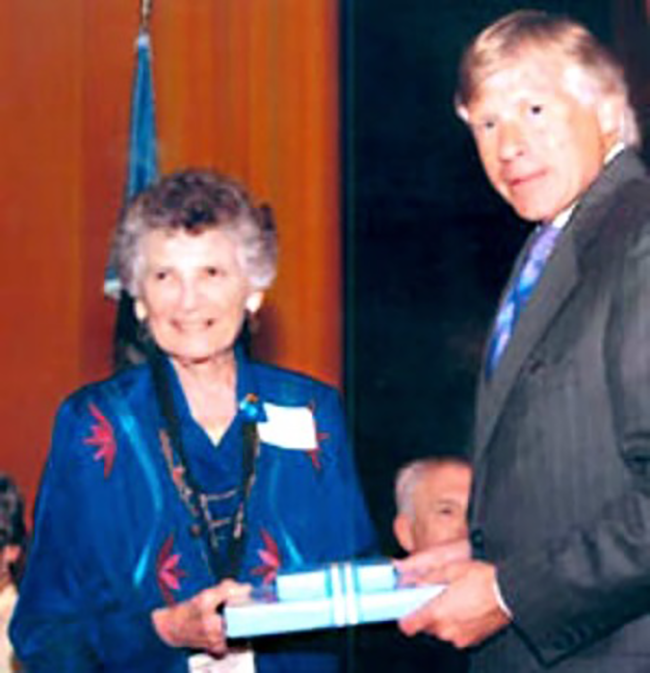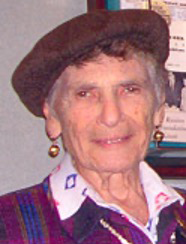An educator, author, and champion for social work. Fund at The Trust continues her support for social work.
Helen Rehr (1919-2013)
“Helen was an original and as such will be impossible to replace,” said the dean of the Columbia University School of Social Work, Jeanette Takamura, referring to Dr. Helen Rehr. “She was full of fire and spice, particularly about her belief that social work practice had lost its way in the decades after the 1980s… We celebrate her life, her many contributions, and her unwavering commitment to social work.”
Helen Rehr was born in the Bronx, the daughter of Philip Rehr, a waiter, and Rose Rehr, Jewish immigrants from Austria. She received a B.A. from Hunter College in 1940 and a master’s in social work from Columbia University in 1945.
Beginning in 1943, she worked in health and mental health fields. In 1954, she joined the Mount Sinai Department of Social Work staff, where she would spend the rest of her professional career. She revolutionized and standardized the field of social work—one of the first to recognize the needs of the aging population for social work services. She also was one of the first to apply the principles of quality assurance and best practices to social work. She introduced patient-screening and risk-identification procedures and was deeply committed to enhancing social services for those who needed them—creating social health care programs and mentoring hundreds of social workers as a teacher.
In her work, she developed innovative, pace-setting programs and effectively demonstrated the essential role social work plays in health and mental health settings. Her career was dedicated to serving clients and demonstrating to health professionals that social work is a vital ingredient in the delivery of effective, quality care.
The chairman of the Mount Sinai Community Medicine Department credited her with creating a Department of Social Work that “was the most effective division of social work in the nation. The research, education, and training productivity has been distinguished and unequaled in quality and excellence.”
Her scholarship included more than 100 articles, books, and chapters on innovative social work practice and policy. The Social Work-Medicine Relationship: 100 Years at Mount Sinai, cowritten with Gary Rosenberg, covered the late-twentieth-century history of the Mount Sinai Medical Center and the formation and evolution of its social work department. It outlined how she and Rosenberg worked with the center’s medical departments and paralleled this to a history of medicine and social work from ancient times through the early 2000s.
The book also examined the pioneering role women have had in the field of social work. Helen told an interviewer: “Writing reflects the thinking and experiences of the professional social worker. I believe both facets need to be tested in professional arenas. By presentation, either in writing or in professional forums, one conceptualizes one’s beliefs and exposes them to open evaluation.”
After receiving her Doctor of Social Work from Columbia University in 1970, she became director of the Mount Sinai Department of Social Work as well as director of the academic division of social work and the division of continuing education at the Brookdale Center. From 1971 to 1986, she was the Edith J. Baerwald Professor of Community and Preventive Medicine at Mount Sinai’s Icahn School of Medicine.
She was an active member of the National Association of Social Workers (NASW) and was a founding member of the NASW National Center for Social Policy and Practice. She chaired the New York City Social Work Pioneers and was a member of its steering committee.

Her passion for excellence and teachings on social justice had impact worldwide. She held visiting professorships at the University of Pennsylvania, Ben Gurion University, Hebrew University, and Haifa University in Israel. She was a principal creator of the Mount Sinai Leadership Exchange Program, which enhances the skills of social work leaders from Israel, Australia, New Zealand, Hong Kong, and Singapore. In Australia, she established a 10-week “international scholars” program, known as the Mount Sinai International Enhancement of Social Work Leadership Program, for senior Australian social workers in the health care system. The program lasted from 1990 to 2012.
She also helped establish a triennial international conference on social work in health and mental health that began in Jerusalem in the early 1990s.
Her recognitions and awards included the Ida M. Cannon award from the Society for Hospital Social Work Directors (1975), election to the Hunter College Hall of Fame (1978), election as a distinguished practitioner to the National Academy of Practice, a commendation from the Joint Commission on Accreditation of Health Care Organizations, a commendation from the Community Mental Health Journal, election as a fellow at the Brookdale Center on Aging at Hunter College, and appointment as Dozor Visiting Professorship at Ben Gurion University (1986). In 1990, she received the first NASW Foundation Knee/Wittman Lifetime Achievement Award in Health and Mental Health. She received the Columbia Alumni Federation’s Distinguished Service Alumni Medal in 2004 and was named to the Hall of Fame at the Columbia University School of Social Work.
While she retired in 1986, she continued as a member of the faculty of the Mount Sinai School of Medicine and consultant to the hospital’s Department of Social Work Services.
She was a member of the school’s doctoral committee and was known for her generosity, endowing the Helen Rehr Scholarship Fund, which provides scholarships to students enrolled in the School of Social Work’s M.S. program, with a strong preference for promising students planning a health care career. She also established the Helen Rehr and Ruth Fizdale Professorship Fund in Health and Mental Health to help the Columbia School of Social Work shape the national debate on health and social policy.
In 2010, the Helen Rehr Center for Social Work Practice was founded on Central Park West to enhance the future of direct practice and to address the commitment to social justice and the unique skills the profession brings to work with individuals, families, and communities. The center carries out its mission through training programs, publications, services, and projects and by collaborating with other organizations in effective advocacy strategies.
In 2011, she created a fund in The Trust to sustain her passion for social work. Helen died in 2013 at age 93.
